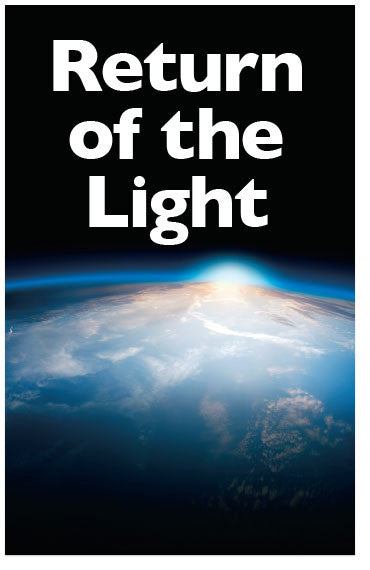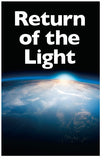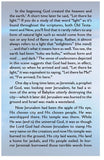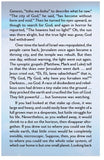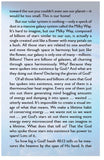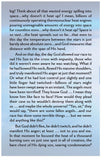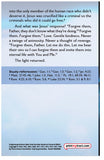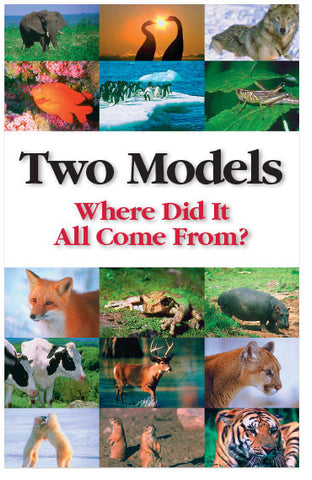Return of the Light (NASB)
Special-Order Folded Tract
 NOTE: This item is custom-printed to order (click for more details).
NOTE: This item is custom-printed to order (click for more details).
This tract is from our print-on-demand library, and is not kept in stock. Select the options below, and we will custom-print a batch just for you. Because this item is custom-printed, you can add your custom imprint to the back page at no extra cost.
- Estimated shipping date: Friday, March 27 (Click for more details)
- SKU:
- Discounts: Discount coupons do not apply to this item
- Format: Folded Tract
- Size: 3.5 inches x 5.5 inches
- Pages: 6
- Imprinting: Available with 5 lines of custom text
- Version: NASB
- Returns: Because this item is custom-printed to order, it cannot be returned.
Show all item details
The full text of this tract is shown below in the NASB version. (Do you want to print this tract in a different version than the one listed? Contact us and let us know what you're looking for—we may be able to create the alternate version for you at no charge.)
In the beginning God created the heavens and the earth.1 A short time later he said, “Let there be light.”2 If you do a study of that word “light” as it’s found throughout the scriptures, both Old Testament and New, you’ll find that it rarely refers to any form of natural light such as would come from the sun or any kind of flame or lamp. Rather, it almost always refers to a light that “enlightens” (the mind) … and that’s what it means here as well. You see, the earth had been “tohu wa-bohu,” without form and void … and dark.3 The sense of uselessness depicted in this scene suggests that God had been, in effect, absent; so when he arrived and said, “Let there be light,” it was equivalent to saying, “Let there be Me!” or, “I’ve arrived; I’m here.”
One day a long time later, as Jeremiah, a prophet of God, was looking over Jerusalem, he had a vision of the army of Babylon utterly destroying the city—which it later did. Jerusalem was burned to the ground and Israel was made a wasteland.
Now Jerusalem had been the apple of His eye, His chosen city and His chosen people. He was worshipped there. His temple was there. While He was (and is) the universal God, it was as though the Lord God had chosen Jerusalem to stamp His very name on the creation; and now His temple was burned to the ground, His city laid waste, His land a home for jackals, and His people exiled. In horror Jeremiah borrowed those terrible words from Genesis, “tohu wa-bohu” to describe what he saw.4 “The city of God,” he said, “has become without form and void.” Then he turned his eyes upward, as though to search for God, and again in horror he reported, “The heavens had no light!” Oh, the sun was there alright, but the true light was gone; God had withdrawn!
Over time the land of Israel was repopulated, the people came back, Jerusalem once again became a thriving city, and the temple was rebuilt. But then one day, without warning, the light went out again. The synoptic gospels (Matthew, Mark and Luke) tell us that the skies over Jerusalem went dark … and Jesus cried out, “Eli, Eli, lama sabachthani?” that is, “My God, My God, why have you forsaken me?”5 Darkness…no God. A race of disobedient and rebellious sons had driven a tiny stake into the ground … they pricked the earth and crucified the Son of God. They felt powerful … but Someone was watching.
If you had looked at that stake up close, it was large and heavy, and could easily bear the weight of a full grown man in a desperate, but futile struggle for his life. Nevertheless, as you walked away, it would shrink to a dot on the horizon, then disappear altogether. If you drew out to where you could see the whole earth, that little cross would be completely invisible, microscopic. Suppose, then, you drew out to where you could see the whole solar system, of which our home is but one small planet. Looking back toward the sun you couldn’t even see our planet—it would be too small. This is our home!
But our solar system is nothing—only a speck of dust in a massive galaxy system called the Milky Way. It’s hard to imagine, but our Milky Way, composed of billions of stars similar to our sun, is actually a single created unit like a flower with many petals on a bush. All those stars are related to one another and move through space in harmony; but just like the flower, our galaxy is only one of many – millions. Billions! There are billions of galaxies, all churning through space harmoniously. Why? Because they were spoken into existence by God.6 And what are they doing out there? Declaring the glories of God!7
Of all those billions and billions of suns that God has spoken into existence, every one of them is a thermonuclear heat engine. Every one of them just sits out there generating mind boggling amounts of energy and dumping it into space … wasted … utterly wasted. It’s impossible to create a visual image of what that means. We make a lifetime habit of conserving energy … we waste not so we want not … yet God’s stars sit out there wasting more energy every microsecond than we can imagine in a lifetime. What does that tell us? That the God who spoke those stars into existence has power to spare! Lots of it.
So how big is God? Isaiah 40:12 tells us he measures the heavens by the span of His hand. Is that big? Think about all that wasted energy spilling into space…why doesn’t it heat up? I mean, billions of continuously operating thermonuclear heat engines pouring unimaginable amounts of energy into space for countless eons…why doesn’t it heat up? Space is so vast…the heat spreads out so far…that even to this day the temperature between the stars is just barely above absolute zero…and God measures that distance with the span of His hand.
And on that day, the day God allowed our race to nail His Son to the cross with impunity, those who did it weren’t even aware he was watching. What if he had bowed His neck, flexed His massive shoulders, and truly manifested His anger at just that moment?! Or what if he had lost control just slightly and one little finger had twitched—billions of stars might have been swept away in an instant. The angels must have been terrified! They know God … I mean they know him like face to face! How would they plead their case so he wouldn’t destroy them along with us … and maybe the whole universe? “Yes, sir,” they would say, “there are some fallen angels…and our race has done some terrible things … but we never did anything like this!”
But God didn’t flex, he didn’t twitch, and he didn’t manifest His anger; at least … not to you and me. In that moment he focused the heat of a thousand burning suns on just one spot in all of creation, the bare chest of His dying son, searing condemnation8 into the only member of the human race who didn’t deserve it. Jesus was crucified like a criminal so the criminals who did it could go free.9
And what was Jesus’ response? “Forgive them, Father, they don’t know what they’re doing.10 Forgive them. Forgive them.” Love. Gentle kindness. Never a twinge of animosity. Never a thought of revenge. “Forgive them, Father. Let me do this. Let me bear their sins so I can forgive them and invite them into eternal life with You and Me.11
The light returned.
Study references: 1 Gen. 1:1; 2 Gen. 1:3; 3 Gen. 1:2; 4 Jer. 4:23; 5 Matt. 27:45-46; 6 John 1:3; Heb. 11:3; 7 Ps. 19:1; 69:34; 96:11; 8 Rom. 4:25; 6:10; 9 Rom. 5:6; 10 Luke 23:34; 11 Rom. 5:1 & 9; 8:1

